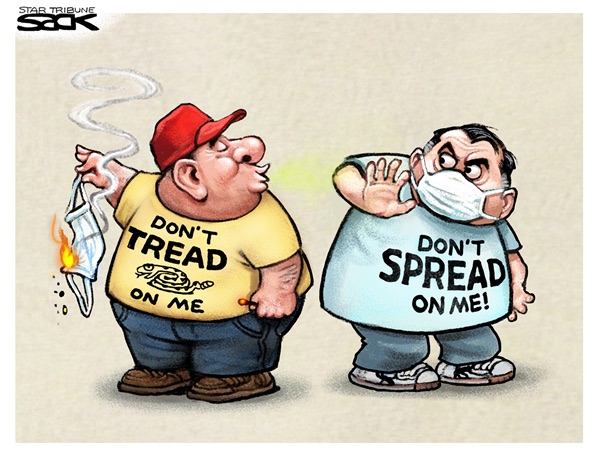Do Face Masks Diminish Disease or Freedom?
Lives, Livelihoods, and Personal Rights Are on the Line

One of the more “interesting” aspects of living through this pandemic is the judgment, indignation, and even rage on display over the wearing of face masks, physical distancing, and shelter in place orders. We see it online and in public — in some cases, in violent outbursts. For some of us, our blood boils when we see non-masked, non-distanced folks at bars and on beaches having the party of their lives — yet for others of us, we are incensed that an employee might refuse service or entry if we’re not masked, or that a government official orders us to stay home. We wonder if those in charge know how to navigate these troubling times.
In an exercise I borrowed from Martín Carcasson, I have folks rank a list of things we hold valuable. Sometimes I use a list of nine, and sometimes just the few we find named in the preamble to our Constitution: justice, security/safety, equality, freedom for us, and freedom for future generations. There are tensions inherent in these values. How do we ensure our own freedom to live as we please while also ensuring freedom for others?
With COVID-19 we don’t have to look very far to see how this ranking plays out in our positions and conflicts. Some of us think the safety and security of ourselves and our loved ones are a greater priority than ensuring our freedom to shop or dine as we please. It’s not that we think freedom is unimportant, but that our freedom won’t do us much good if we’re dead, or that our own freedom should not come at the cost of someone else’s safety. Yet others of us worry that even the temporary erosion of our civil liberties will be a slippery slope toward less and less freedom, which will become more and more permanent, for both ourselves and our posterity.
If we only focus on safety or freedom, we come to an impasse — or the rage we see playing out. But there are other values at play here. Health-care professionals beg us to wear masks not so much to protect our own health but to protect the health of the most vulnerable by reducing the virus spread by non-symptomatic carriers. Yet most debates on mask wearing in the public square still boil down to personal vulnerability and/or personal rights.
Our fears make this even more complicated. For some the scariest threat is losing a loved one to the virus. For others, the greater threat is losing a source of income and therefore the ability to maintain a roof overhead and food on the table. And when we’re afraid, we can sometimes act selfishly, irrationally, or foolishly.
This pandemic also surfaces the fault lines and inequities in our society — those who have power and resources, and those who don’t. A middle-class person with a job that can be done remotely has many more choices when it comes to deciding how to comply with or resist health orders. Many of the “essential” workers are also the poorest, and therefore have much less freedom or flexibility to decide whether or not it is safe to work. They must work in sometimes unhealthy conditions and risk contracting the virus themselves or passing the virus on to their loved ones. If they speak up, they may be fired or sidelined. Infection, hospitalization, and death rates are higher in poor and/or minority communities. This is not an accident. As David Brooks recently noted, inequality makes us less resilient. We are connected — so we have to connect our responses. In this era of populism, nationalism, and “me first,” our individuality may actually kill us.
We need robust conversation to weigh these tensions and trade-offs, between our civil liberties and our need for safety and security, between the needs of the many vs. the needs of the few, between preserving human life via non-illness vs. preserving human life via wellness in all senses of the word. Recognizing that these value choices inform our perspectives and positions, we need to avoid politicizing mask wearing.
It’s not about who you support for president. It’s not even, totally, about you. Let’s expand our notions of freedom and safety to include others. Let’s speak and listen well together. Put the economists, health experts, social workers, and poets in the same room. Hash out the upsides and downsides of proposed policies and treatments. Weigh the trade-offs. Be transparent. Allow citizens to hear the deliberations. Help the entire electorate walk through this process.
The outcome will be so much better than shooting the store employee who asks you to wear a mask. And until we have either “herd immunity” or something better, just wear the mask.
Dr. Deborah Dunn chairs the Westmont College Communication Studies Department and co-directs the Westmont Initiative for Public Dialogue and Deliberation.



